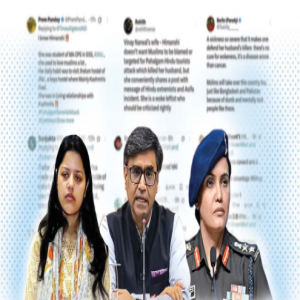
 Fr. Gaurav Nair
Fr. Gaurav Nair

By its nature, hate respects no boundaries—geographic, religious, communal, or moral. In failing to confront Hindutva extremist hate speech decisively, India has jeopardised its existence and that of the people who live within it.
In a degrading display of Sanatana Dharma, Foreign Secretary Vikram Misri faced a vicious onslaught from the Hindutva fold following his announcement of the India-Pakistan ceasefire on May 10, a decision that was, by the way, taken by the top. The venomous abuse was not only aimed at the messenger but extended even to his daughter, a lawyer who has defended members of the Rohingya community. The sheer pettiness and crudeness of the attacks laid bare, once again, the ideological rot and disturbed psyche behind the rhetoric of Hindutva crusaders.
These are not isolated incidents. Madhya Pradesh Minister Kunwar Vijay Shah's vulgar language in describing Colonel Sofia Qureshi at a public rally in Mhow is a glimpse of what the Indian mindset is moving towards, and the consequences are not going to be pleasant. When it was felt that his remarks would not go unchecked, the BJP lightly rapped him on the knuckles and tried to justify him. The fact that he is still a minister and that the BJP top guns are silent on this issue evidences that his words are the BJP's. Though the Jabalpur High Court has taken cognisance of the vitriol and declared it "language of the gutters," it remains to be seen if it leads to anything.
Himanshi Narwal, who the BJP tried to make the "poster girl" of their campaign, soon became the target of their diatribes when she called for peace. She was vilified and silenced, and was character assassinated. Whether they dug into her past or picked apart her education, speculated about her future choices or hurled crude insults at her private life, the trolls attacked every facet of her character, questioning her integrity, her motives, and every single detail.
Not just Himanshi Narwal, Arathi Menon, who lost her father in the same deadly terrorist attack in Pahalgam, was also subjected to online trolling. For Menon, the backlash began when she shared that the tragedy had given her two brothers.
Generally, women became easy pickings as they are sexualised and attacked by the hatemongers who, faithful to the teachings of Manu, are deeply misogynistic and casteist.
While the Indian army exchanges blows with threats without, a war is being waged within the country against its own minorities. The nauseating display should suffice to show saffron supporters of what everything they stand for will eventually devolve into.
And yet, outrage remains muted. Political leaders have offered half hearted condemnations while perpetrators roam free; social media platforms fail to moderate abusive content; law enforcement drags its feet on enforcing provisions against hate speech. This climate of impunity sends a brutal message: that targeting the vulnerable is not only tolerated but is tacitly endorsed. It is going to be the new normal.